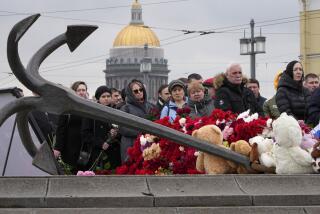Soviet Rock Luminaries Jam for Nuclear Evacuees
MOSCOW — Leading Soviet rock musicians, performing amid green light beams, swirls of machine-generated smoke and batteries of speakers, gave a benefit concert Friday for the victims of the Chernobyl nuclear plant disaster.
“Money is money,” Alla Pugacheva, probably the most popular singer in the country, told the audience of 30,000. “Tonight, we want to give our hearts to the people who were affected.”
The 2 1/2-hour event was called “Account 904”--the number of the bank account where the public has been asked to send contributions for Chernobyl relief of the 92,000 people evacuated from the disaster area.
Pugacheva said the box office receipts will provide about $140,000 for the relief fund. Records and tapes will be made of the performances, she said, and could raise millions more for the people who had to leave their homes in the danger zone, some with little more than the clothes on their back.
Pugacheva said the concert was conceived by musicians who saw television reports on the accident and wanted to make a contribution to the relief effort.
Olympic Stadium Used
Addressing the audience in the indoor stadium built for the 1980 Olympics, she urged them to send donations to the Account 904 at the Kiev State Bank. Kiev, 60 miles south of Chernobyl, is the closest large city to the disaster site.
The government television network showed none of the benefit concert. It offered as its feature program after the evening news a European singing contest in Norway. Nor was there any mention of the concert on the main news program. And the concert was given virtually no advance publicity in the controlled press.
However, the concert was filmed by television and may be shown at a later date, said Art Troitsky, the concert organizer and manager of Bravo, one of the rock groups participating.
Also, there was a TV hookup via satellite to Kiev where a Soviet journalist, Vladimir Svetov, presented a parade of people who had done cleanup work around the stricken nuclear power plant.
“Come on, let’s applaud every time we hear the name of that town!” Pugacheva urged as miners, firemen and others sent greetings to the Moscow audience and performers.
‘Our Heartfelt Thanks’
A Chernobyl worker later expressed “our heartfelt thanks” to balladeer Alexander Gradsky, whose set won a long ovation from the Moscow audience.
In the most moving segment, the audience stood in silence to honor those who died in the world’s worst nuclear accident and its aftermath. The toll now stands at more than 20.
Rock music, in the opinion of some Communist Party ideologues, is suspect because of its Western origins and association with a hedonistic life style. Nonetheless, rock groups are tolerated, and some of the most popular were on the stage to promote Chernobyl relief.
According to Troitsky, musicians got the idea for the concert and obtained support from Communist Party and Moscow city authorities.
“Things are getting a little bit better for us in music,” said a musician who would identify himself only as Sasha.
No Western Rock Stars
Time was too short to line up Western rock stars for the show, he said, but Pugacheva said another concert might be organized in August with international participation.
Troitsky said he would like to have an international concert including Bruce Springsteen, Julian Lennon, Stevie Wonder, Paul McCartney and the rock group Dire Straits. None has performed in the Soviet Union.
Pugacheva led the first song called “Twentieth Century.” A group known as Autograph, which took part in last July’s Live Aid concert to benefit African famine relief, was the lead-off group for the Chernobyl program.
The audience was subdued by comparison to rock concert crowds in the West, and applauded almost dutifully as the Autograph group and another known as Recital performed.
The biggest applause was for Alexander Gradsky, a tenor with a powerful voice who accompanied himself on the guitar and dedicated a song to the memory of the late Vladimir Vysotsky, a composer and ballad singer.
A heavy metal group, called Kruiz, was so loud that many in the audience put their hands over their ears. Its members came as close as Soviet musicians do to the punk style, with the lead guitarist wearing a black sleeveless shirt, red vest and shoes and black satin pants with glittering trim.
More to Read
Sign up for Essential California
The most important California stories and recommendations in your inbox every morning.
You may occasionally receive promotional content from the Los Angeles Times.










